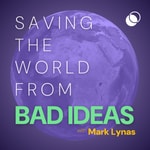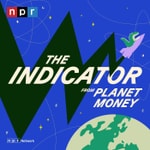Saving the World From Bad Ideas – Details, episodes & analysis
Podcast details
Technical and general information from the podcast's RSS feed.

Saving the World From Bad Ideas
WePlanet
Frequency: 1 episode/7d. Total Eps: 21

Recent rankings
Latest chart positions across Apple Podcasts and Spotify rankings.
Apple Podcasts
🇬🇧 Great Britain - science
01/08/2025#70🇬🇧 Great Britain - science
31/07/2025#52🇬🇧 Great Britain - science
13/05/2025#100🇬🇧 Great Britain - science
12/05/2025#62🇬🇧 Great Britain - science
11/05/2025#63🇬🇧 Great Britain - science
10/05/2025#58🇬🇧 Great Britain - science
09/05/2025#52🇬🇧 Great Britain - science
21/04/2025#80🇬🇧 Great Britain - science
20/04/2025#80🇬🇧 Great Britain - science
19/04/2025#63
Spotify
No recent rankings available
Shared links between episodes and podcasts
Links found in episode descriptions and other podcasts that share them.
See all- https://ourworldindata.org/
58 shares
- https://futureoflife.org/
19 shares
- https://www.openphilanthropy.org/
18 shares
- https://twitter.com/weplanetint
11 shares
RSS feed quality and score
Technical evaluation of the podcast's RSS feed quality and structure.
See allScore global : 68%
Publication history
Monthly episode publishing history over the past years.
Bad Idea #1 "No such thing as progress" with Steven Pinker
Season 1 · Episode 1
jeudi 3 avril 2025 • Duration 44:08
🔍 Episode Summary:
In the inaugural episode of Saving the World from Bad Ideas, Mark Lynas is joined by renowned psychologist and best-selling author Steven Pinker to challenge the pervasive myth that the world is in terminal decline.
Steven makes the case for progress as a measurable, empirical reality, highlighting how improvements in health, literacy, poverty, and safety have transformed human life — even if we rarely hear about them. Together, they explore the psychological biases behind pessimism, the rise of reactionary politics, the dangers of nuclear weapons, and the pitfalls of modern progressive movements.
From Enlightenment ideals to eco-modernism, it's a wide-ranging conversation on how to make the world better — rationally.
🧠 Topics Discussed:
📈 What progress really means — and how we can measure it
📰 Why the media distorts our sense of reality
⚙️ The Enlightenment roots of knowledge-driven human improvement
🧨 Why nuclear weapons remain an existential threat
🧠 How to rebuild a rational, empirical environmental movement
🧵 The rise of wokeism and internal collapse of progressive institutions
🇺🇸 Trumpism, authoritarianism, and global democratic backsliding
- 🌿 Is eco-modernism the future of environmentalism?
- 👥 How to lead change without tribalism or culture war
👨🏫 Guest Bio:
Rationality: What It Is, Why It Seems Scarce, Why It Matters
Enlightenment Now: The Case for Reason, Science, Humanism, and Progress
The Better Angels of Our Nature: Why Violence Has Declined
Steven Pinker is Professor of Psychology at Harvard University and the author of numerous influential books, including:
He’s a prominent public intellectual, defender of Enlightenment values, and an optimist — but not the naive kind.
📚 Recommended Reading:
Enlightenment Now – Steven Pinker
The Better Angels of Our Nature – Steven Pinker
Whole Earth Discipline – Stewart Brand
Apocalypse Never – Michael Shellenberger
🎵 Tom Lehrer’s song "We Will All Go Together When We Go"
💬 Quote Highlights:
“The news by its very nature is bound to oversample bad things and neglect good things.” — Steven Pinker
“Not all cultures are going to agree with the latest cause from elite left-wing urban American universities.” — Steven Pinker
“Nuclear weapons can end civilization in a matter of hours. It’s astonishing that literally the end of the world is not an issue.” — Steven Pinker
“Let's treat environmental problems as challenges to be solved, not moral failings to be punished.” — Mark Lynas
🌐 About WePlanet:
WePlanet is a global movement of citizens and scientists dedicated to defending the science and solutions we need to protect our environment and civilisation. Learn more at weplanet.org.
📥 Join the Conversation:
💬 Got thoughts? Email us: podcast@weplanet.org
📬 Join our podcast mailing list: weplanet.org/podcast
Bad Idea #2 "Everything is getting worse!" with Hannah Ritchie
Season 1 · Episode 2
jeudi 3 avril 2025 • Duration 01:14:03
🔍 Episode Summary:
In this energising and data-packed conversation, Mark Lynas sits down with Hannah Ritchie, lead researcher at Our World in Data and author of Not the End of the World, to confront one of the most pervasive bad ideas out there: that everything is getting worse.
Hannah argues that, while environmental challenges are real and urgent, the story of human progress is just as important — and overwhelmingly positive. From reductions in child mortality and extreme poverty to progress on clean energy and air pollution, Hannah lays out the evidence that things are getting better, and explains why excessive doomerism and moralising can get in the way of real climate action.
They tackle controversial topics like degrowth, depopulation, meat consumption, nuclear and renewables, and more — all with the goal of defending optimism grounded in facts.
🧠 Topics Discussed:
📊 Why most people are wrong about the state of the world
👶 Huge progress in child and maternal mortality
🌍 The truth about extreme poverty and hunger
🌳 Have we passed peak deforestation?
🌬️ Air pollution: the global success story no one talks about
📰 Media-driven negativity bias and noble cause corruption
🐄 How reducing beef and lamb consumption could halve farmland use
⚡ Why energy is solvable — but food is the real moonshot
🧫 Lab-grown meat, innovation, and pragmatic environmentalism
💥 Why degrowth and depopulation arguments fall flat
💡 Rebranding eco-modernism and the power of “urgent optimism”
👩🔬 Guest Bio: Hannah Ritchie is Deputy Editor and Lead Researcher at Our World in Data and author of the best-selling book Not the End of the World: How We Can Be the First Generation to Build a Sustainable Planet. Her work focuses on using data to understand and solve the world’s biggest problems — from climate change to poverty and health. Hannah is also the co-host of the podcast Solving for Climate, where she interviews innovators working on climate solutions.
📚 Recommended Reading & Resources:
Not the End of the World – Hannah Ritchie
Factfulness – Hans Rosling
Enlightenment Now – Steven Pinker
💬 Quote Highlights:
“The world can be terrible, getting better, and still need to improve — all at the same time.” — Hannah Ritchie
“Climate change is a catastrophic risk, but not an existential one. And that distinction matters.” — Hannah Ritchie
“We don't just need anger — we need a vision for a better future to work toward.” — Hannah Ritchie
“We can’t solve problems by moralising people into submission. We need good, scalable alternatives.” — Mark Lynas
🌐 About WePlanet:WePlanet is a global citizen and science movement defending the science-based solutions we need to save the world — from clean energy and sustainable food to prosperity for all. Learn more at weplanet.org.
📥 Join the Conversation:💬 Feedback? Thoughts? Email us: podcast@weplanet.org
📬 Get alerts when new episodes drop: weplanet.org/podcast
Launching Saving The World From Bad Ideas
Season 1
mercredi 19 mars 2025 • Duration 02:10
TRAILER
What if some of the biggest obstacles to saving the planet aren’t what you think? In Saving the World from Bad Ideas, Mark Lynas—once a self-proclaimed eco-activist turned science advocate—is here to question the ideas that shape environmental debates.
Are GMOs really dangerous? Is nuclear power a threat or a solution? Will billions die from climate change? With sharp discussions and guests like Steven Pinker, Hannah Ritchie, and George Monbiot, this podcast digs into the myths, misconceptions, and inconvenient truths that too often go unchallenged.
If you're ready to rethink everything you thought you knew about saving the planet, hit subscribe.
Bad Idea #5 "Progress is inevitable" with George Monbiot
Season 1 · Episode 5
jeudi 17 avril 2025 • Duration 01:01:57
🔍 Episode Summary:
In this powerhouse episode, Mark Lynas is joined by long-time friend and environmental journalist George Monbiot for a brutally honest conversation on where we are — and how we fight back. Together they challenge the idea that environmental progress is automatic or guaranteed, and instead delve into the deep political, economic, and social forces that shape our chances for a better future.
Monbiot argues that unless we confront power, capitalism, and the failure of incrementalism, we’re simply sleepwalking into authoritarianism and ecological collapse. From colonialism to neoliberalism, from fascism to the failures of the left, this is a sweeping conversation on what went wrong — and how we can make things right, through a positive politics of belonging.
This one pulls no punches.
🧠 Topics Discussed:
🏛️ Why environmentalism fails without confronting power
🛑 The myth of inevitable progress — and how it can be reversed
⚡ Technology is not enough: the limits of "techno-fix" thinking
💰 A crash course in the real origins of capitalism
📉 Why incremental change is a losing strategy
📢 What neoliberalism really is — and how it disempowers citizens
🧱 Private sufficiency, public luxury: a new vision for the future
🧠 Why the left keeps losing — and what must change
🎯 Popper’s paradox, politics of belonging, and how to counter fascism
📲 How social media is supercharging authoritarianism
😤 Can we still win? Yes — but only if we act boldly
👨🏫 Guest Bio:
George Monbiot is a columnist for The Guardian, environmental activist, and author of several books including Regenesis, Out of the Wreckage, and The Invisible Doctrine (with Peter Hutchison). He’s one of the most influential and outspoken voices on the British left — and he’s spent four decades fighting for ecological justice, democratic reform, and systemic change.
📚 Recommended Reading & Resources:
💬 Quote Highlights:
“Progress is not inevitable. And if you don’t confront power, you lose — every time.” — George Monbiot
“Capitalism didn’t start with commerce. It started with slavery and extraction.” — George Monbiot
“If we fail to offer a positive politics of belonging, the fascists will offer a negative one — and people will choose it.” — George Monbiot
“Incrementalism is not a theory of change. It’s an excuse for failure.” — George Monbiot
“We need a politics of private sufficiency, public luxury.” — George Monbiot
🌐 About WePlanet:
WePlanet is a global citizen and science movement advocating for bold, science-based solutions to the world’s greatest challenges. We fight bad ideas with better ones. Learn more at weplanet.org.
📥 Join the Conversation:
💬 Got thoughts on this episode? Email us: podcast@weplanet.org 📬 Subscribe for future episodes: weplanet.org/podcast
Bad Idea #4 "The global south can skip fossil fuels" with Vijaya Ramachandran
Season 1 · Episode 4
jeudi 10 avril 2025 • Duration 01:02:25
🔍 Episode Summary:
In this searing and deeply compelling conversation, Mark Lynas speaks with Vijaya Ramachandran, economist and Director for Energy and Development at the Breakthrough Institute, to unpack what she calls one of the worst “bad ideas” shaping today’s climate discourse: the blanket opposition to fossil fuel development in the Global South.
From indoor air pollution to energy inequality, and from misguided climate justice campaigns to blatant geopolitical hypocrisy, Vijaya takes aim at the idea that development must be sacrificed for the climate. She explains why poor countries need more energy — including some fossil fuels — in order to fight poverty, save lives, and build resilience to climate shocks.
If you think climate justice means banning gas in Africa, you might want to listen to this first.
🧠 Topics Discussed:
🔥 Why LPG (liquified petroleum gas) is clean cooking, not dirty energy
🫁 3.8 million deaths a year from household air pollution
🌲 How clean fossil fuels can save forests and reduce emissions
🧮 The carbon math: Germany’s LNG expansion vs all of Africa’s LPG
🤯 The World Bank’s fossil fuel financing ban — who it really affects
💸 Hypocrisy in action: Norway, Germany, and the United States
⚖️ Why energy inequality is a moral and not just technical issue
🧱 Fossil fuels for fertiliser, cement, steel, and climate adaptation
🚫 The limits of leapfrogging: why renewables alone aren’t enough
🧬 What real climate justice would look like for developing nations
🌍 Could “green colonialism” break the Paris climate consensus?
👩🏫 Guest Bio:
Vijaya Ramachandran is Director for Energy and Development at the Breakthrough Institute and an economist who has written for Nature, Foreign Policy, and The Economist. Her research focuses on energy access, development, and the geopolitics of climate finance. She's a fierce advocate for energy equity and pragmatic climate solutions rooted in the needs of the world’s poorest.
📚 Recommended Reading & Resources:
Foreign Policy – The Green Colonialism Essay by Vijaya Ramachandran
How the West Is Pushing Africa Away from Gas – Breakthrough Institute
Why LPG Is Good for the Climate – WePlanet article by Mark Lynas
Our World in Data – Energy Access
IEA Clean Cooking Investment Tracker
💬 Quote Highlights:
“LPG saves lives. It’s better for women, better for children, and even better for the climate when you look at the alternatives.” — Vijaya Ramachandran
“You can’t cook with wind and solar. That’s the reality for hundreds of millions of people.” — Vijaya Ramachandran
“The World Bank’s fossil fuel financing ban only hurts the poorest — and it won’t solve climate change.” — Mark Lynas
“Climate justice has become what Western NGOs want, not what poor people actually need.” — Vijaya Ramachandran
🌐 About WePlanet:WePlanet is a global citizen and science movement dedicated to bold, science-based solutions for climate and development. We believe in energy abundance, food security, and global prosperity — without environmental collapse. Learn more at weplanet.org.
📥 Join the Conversation:
💬 Email feedback: podcast@weplanet.org 📬 Sign up for updates: weplanet.org/podcast
Bad Idea #3 "We shouldn’t even talk about geoengineering!" with Oliver Morton
Season 1 · Episode 3
vendredi 4 avril 2025 • Duration 59:27
🔍 Episode Summary:
In this thought-provoking episode, Mark Lynas is joined by science writer and The Planet Remade author Oliver Morton for a candid conversation about geoengineering — the controversial set of technologies that could help us cool the planet.
Oliver argues that not talking about solar geoengineering might itself be a bad idea, especially as climate change accelerates and overshoot scenarios become more likely. They explore how stratospheric aerosols, inspired by volcanic eruptions, could reflect sunlight and reduce warming, and why such solutions are currently taboo in many environmental circles.
The episode tackles moral hazard, global equity, the politics of climate action, and why global South leadership is essential for legitimate discussion. Mark even finds himself inching toward changing his own mind — again.
🧠 Topics Discussed:
🌍 Why the conversation around geoengineering has barely moved since The Planet Remade (2015)
🌡️ Solar vs. carbon dioxide removal (CDR) geoengineering
🌋 Volcanoes, aerosols, and the science behind reflecting sunlight
🤐 The dangers of not talking about solar geoengineering
🎭 Climate discourse, moral hazard, and the “technofix” taboo
⚖️ Why global South voices are critical to the legitimacy of the debate
🔥 Whether the current warming justifies reconsidering “unthinkable” options
💣 Nuclear weapons, termination shock, and existential risk
🎵 Meatloaf, billiards, and asteroid jokes (yes, really)
🧑🔬 Guest Bio: Oliver Morton is a senior editor at The Economist, former science writer for Nature, and author of The Planet Remade: How Geoengineering Could Change the World. He has an asteroid named after him — and no, it's not headed toward Earth.
📚 Recommended Reading
The Planet Remade – Oliver Morton
Paul Crutzen’s 2006 paper on stratospheric aerosols
IPCC Special Report on 1.5°C
Reports by the Degrees Initiative
📝 Quote Highlights:“If we have to wait until everyone agrees on how to act in order to address climate change, we are not going to address climate change.” — Oliver Morton
“People say the world is burning but refuse to even consider options that might stop it from burning. That’s a hard position to defend.” — Mark Lynas
🌐 About WePlanet:WePlanet is a citizen and science movement that challenges conventional thinking to defend evidence-based solutions to environmental challenges. Learn more at weplanet.org.
📥 Join the Conversation:💬 Got thoughts on geoengineering?
Email us: podcast@weplanet.org📬 Sign up for updates: weplanet.org/podcast
Bad Idea #8 "We need nuclear weapons to stop nuclear war" with Alan Robock
Season 1 · Episode 8
jeudi 8 mai 2025 • Duration 01:01:39
🔍 Episode Summary:
In this urgent and wide-ranging conversation, Mark Lynas is joined by leading climate scientist and nuclear winter expert Alan Robock to confront one of the most dangerous myths of our time: that nuclear weapons keep us safe.
Alan lays out why deterrence is a flawed and suicidal strategy, how even a "limited" nuclear war would trigger global famine and societal collapse, and why the existence of nuclear weapons means their eventual use is a matter of when, not if. They also discuss the atmospheric science of nuclear winter, parallels to the asteroid that killed the dinosaurs, the threats posed by solar geoengineering, and why total nuclear abolition is not only possible — but urgently necessary.
This is a masterclass in existential risk — and why we ignore it at our peril.
🧠 Topics Discussed:
🚫 Why nuclear deterrence is a myth — and how luck has saved us so far
☠️ Nuclear winter: how cities burning would darken and freeze the planet
🌾 Nuclear famine: why over a billion people could starve even after a "small" war
🔥 From Hiroshima to today: how firestorms drive catastrophic global cooling
🌍 The Southern Hemisphere’s relative survival — and why it’s not so simple
✊ The Treaty on the Prohibition of Nuclear Weapons and ICAN’s Nobel Peace Prize
🛰️ How volcanic eruptions and wildfire smoke prove the nuclear winter theory
🦖 What the dinosaurs can teach us about the end of the world
🛑 Geoengineering: why "climate intervention" may be as dangerous as the problem
💬 Why humanity must choose: the end of nuclear weapons or the end of us
👽 The Drake equation, Fermi paradox — and why advanced civilizations may self-destruct
👨🏫 Guest Bio:Alan Robock is a Distinguished Professor of Environmental Sciences at Rutgers University. He is one of the world’s leading authorities on nuclear winter, climate modeling, and the atmospheric consequences of both nuclear war and geoengineering. Alan is a veteran campaigner for nuclear disarmament and an award-winning researcher committed to educating the world about the existential threats we face.
📚 Recommended Reading & Resources:
Earth in Flames: Nuclear Winter and How to Prevent It – Alan Robock & Brian Toon (out June 2025)
💬 Quote Highlights:
“Deterrence only works if you’re willing to commit suicide. That’s not a strategy — that’s madness.” — Alan Robock
“Nuclear winter is not a theory from the 1980s. It’s physics. Block the sun, and the planet freezes.” — Alan Robock
“Even a limited nuclear war could kill two billion people by famine alone.” — Alan Robock
“You can dismantle nuclear weapons. We had 70,000 once. Now we have 12,000. We can go to zero.” — Alan Robock
“The existence of nuclear weapons guarantees their eventual use — unless we abolish them.” — Alan Robock
Bad Idea #7 "We Can't co-exist with wolves" with Luigi Boitani
Season 1 · Episode 7
jeudi 1 mai 2025 • Duration 51:49
🔍 Episode Summary:
In this compelling conversation, Mark Lynas speaks with world-renowned conservation biologist Luigi Boitani to tackle one of the most polarizing debates in wildlife conservation: whether humans and wolves can truly coexist.
Luigi, who has spent over five decades studying wolves across Europe and North America, explains why the return of the wolf is not an ecological anomaly — but a natural recovery.
Together, they explore the myths that surround wolves, the emotional bonds humans have forged with them, and the hard compromises needed for real coexistence. From debunking the Yellowstone "miracle" story to examining the politics of wolf conservation across Europe, this episode goes far beyond fairy tales to face the real challenges — and opportunities — of living alongside large carnivores again.
🧠 Topics Discussed:
🐺 What really defines "wolf habitat" — and why wolves don't need wilderness
🌍 How wolves recolonized Europe without reintroductions
❤️ Why humans have a deep emotional connection to wolves — and always have
📉 Debunking the Yellowstone 'trophic cascade' myth
🔀 The true meaning of coexistence — and why compromise is essential
🚫 Why political myths about wolves are driving bad policy across Europe
🏞️ Why rewilding efforts in places like the UK are emotionally compelling — but complicated
🐑 Conflict with livestock: guarding dogs, electric fences, and the limits of compensation
🧬 The risks of wolf population fragmentation from border fences
👥 How science can inform, but not replace, political decisions
👨🏫 Guest Bio:
Professor Luigi Boitani is Professor Emeritus of Conservation Biology at the University of Rome Sapienza and Chair of the Large Carnivore Initiative for Europe (IUCN SSC). He is one of the world's leading experts on wolf conservation, human-wildlife coexistence, and large carnivore management. His research has shaped European policy and global understanding of large predator recovery.
📚 Recommended Reading & Resources:
Large Carnivore Initiative for Europe — IUCN Specialist Group
Yellowstone Wolves — book referenced by Luigi Boitani
IUCN Guidelines on Human-Wildlife Conflict and Coexistence
💬 Quote Highlights:
“The best definition of wolf habitat is anywhere there's something to eat — and where you’re not shot.” — Luigi Boitani
“Be honest: the real reason we want wolves back is because we love them, not because of ecosystem services.” — Luigi Boitani
“Coexistence means compromise. Without it, we’re just dreaming.” — Luigi Boitani
“Even today, most human cultures feel the charisma of the wolf — and build it into their myths and beliefs.” — Luigi Boitani
“The Yellowstone story is beautiful, but even the scientists admit: we don’t really know what’s going on.” — Luigi Boitani
🌐 About WePlanet:
WePlanet is a global citizen and science movement advancing bold, evidence-based solutions for climate, nature, and human development. Learn more at weplanet.org.
📥 Join the Conversation:
💬 Feedback or thoughts? Email: podcast@weplanet.org
📬 Subscribe for updates: weplanet.org/podcast
🐦 Follow us on Twitter/X: @WePlanetInt
Bad Idea #6 "We can still save the arctic" with Julienne Stroeve
Season 1 · Episode 6
jeudi 24 avril 2025 • Duration 01:04:20
🔍 Episode Summary:
What if the bad idea… is thinking we can still save the Arctic?In this sobering but illuminating conversation, Mark Lynas speaks with renowned polar climate scientist Julienne Stroeve to explore one of the most consequential but misunderstood climate tipping points: the melting of the Arctic.
Together, they unpack the science behind sea ice loss, permafrost thaw, Greenland melt, and the feedback loops that could push the climate system toward runaway warming. Julienne, who has spent decades conducting fieldwork and analysing satellite data, explains why the idea that we can still "save" the Arctic is, sadly, a myth — and what that means for global sea level rise, extreme weather, and the fate of species like polar bears.
From icebreaker expeditions to geoengineering schemes, this episode takes you to the frontlines of a rapidly disappearing world.
🧠 Topics Discussed:
🧊 Why the Arctic sea ice is already committed to disappearing in summer
📉 The science behind Greenland’s melt — and how fast it’s accelerating
🌊 Sea level rise: how much, how soon, and where it hits hardest
🐻 Polar bears, permafrost, and the myth of adaptation
💣 The risk of tipping points and feedback loops (albedo, methane, etc.)
❄️ What past interglacial periods tell us about a future without Arctic ice
🌍 Why what happens in the Arctic doesn’t stay in the Arctic
🌀 Jet streams, polar vortexes, and extreme weather in a warming world
🧪 Geoengineering: what might work, what probably won’t
🛰️ The role of satellites and field data in improving climate models
🇺🇸 The growing threat of political interference with science in the US
👩🔬 Guest Bio:
Dr. Julienne Stroeve is a polar climate scientist and professor currently affiliated with the University of Manitoba and University College London. Her work focuses on satellite remote sensing, Arctic sea ice, climate modeling, and the impacts of climate change on polar systems. She has participated in numerous field expeditions, including the landmark MOSAiC expedition, and is one of the world’s leading experts on Arctic cryosphere dynamics.
📚 Recommended Reading & Resources:
Why the Arctic Is Already Lost – Science commentary by Julienne Stroeve (via Science.org)
Article: Why Geoengineering the Arctic is a Bad Idea – The Conversation
💬 Quote Highlights:
“The Arctic is warming four times faster than the global average.” – Julienne Stroeve
“The idea that we can still save the Arctic is a bad one. It’s already on a committed trajectory of decline.” — Julienne Stroeve
“What happens in the Arctic doesn’t stay in the Arctic. It reshapes weather patterns across the globe.” — Julienne Stroeve
“Greenland is now the largest contributor to sea level rise — and that contribution is accelerating.” — Julienne Stroeve
“At 2.7 degrees of global warming, parts of the world will become uninhabitable.” — Julienne Stroeve
“I used to be hopeful. But now? I think we’ll wait for disaster — and then act.” — Julienne Stroeve
🌐 About WePlanet:
WePlanet is a global citizen and science movement advancing bold, evidence-based solutions for climate, nature, and human development. Learn more at weplanet.org.
📥 Join the Conversation:
💬 Feedback or thoughts? Email: podcast@weplanet.org 📬 Subscribe for updates: weplanet.org/podcast
Bad Idea #19 "greens are anti-science" with Tea Törmänen
Season 1 · Episode 19
jeudi 24 juillet 2025 • Duration 57:24
🔍 Episode Summary
Can Greens support nuclear power? Finnish environmentalist and WePlaneteer Tea Törmänen joins Mark Lynas to dismantle Bad Idea #19: “greens are anti-science.” With clarity, courage, and a wealth of lived experience, Tea shares her journey from feeling like an outcast in the environmental movement to helping make the Finnish Green Party officially pro-nuclear.
Drawing from decades of activism, Tea explains how anti-nuclear sentiment became part of the environmentalist identity — and how that is now changing. She unpacks the myths around waste, safety, cost, and tribal loyalties, and shows how climate goals demand pragmatic, science-based solutions — including nuclear energy.
From wolves to fast reactors, American football to European energy policy, this episode explores what it takes to change minds and movements — and why it’s time for Greens everywhere to evolve.
🧠 Topics Discussed
● 🌱 How anti-nuclear views became “baked into” green identity
● 🧠 Tribalism, virtue, and the psychology behind environmental dogmas
● 🚧 Why Greens often oppose solutions more than problems
● 🗳️ How the Finnish Green Party became officially pro-nuclear
● ⚛️ Myths about nuclear waste and how Finland solved it
● ☢️ Radiation vs risk: what safety really looks like
● 🔁 Nuclear fuel recycling and “the waste of waste”
● 🧊 Why SMRs could decarbonize district heating
● 🌍 Building a global pro-nuclear environmental movement
● 🧬 From gene tech to clean heat — embracing science in climate action
● 💚 Finding your tribe when you don’t fit into one box
👩🏫 Guest Bio Tea Törmänen is a Finnish environmentalist, science advocate, and movement builder. She’s a former chair of WePlanet Finland and played a key role in shifting the Finnish Green Party toward a pro-nuclear and pro-GMO stance. With a background in animal cognition research and a fierce commitment to evidence-based activism, Tea combines a passion for nature with a pragmatic embrace of clean technologies. She’s also a former a Finnish national team American football player and a wolf behaviour researcher.
📚 Recommended Reading & Resources
● Prescription for the Planet – Tom Blees
● Not Beyond Redemption – Tea’s upcoming work (TBD)
● Apocalypse Never – Michael Shellenberger
● The God Species – Mark Lynas
● Finnish Green Party platform (updated pro-nuclear position)
● POSIVA – Finnish nuclear waste repository project
● Barakah Nuclear Power Plant (UAE case study)
💬 Quote Highlights
“Being an environmentalist doesn't mean rejecting technology — it means embracing what works.”
“Too much clean energy? That’s not a problem. That’s the solution.”
“We solved nuclear waste in Finland. It was never a technical issue. It was political.”
“You don't stop climate change by limiting options. You stop it by using all the best ones.”
“I never fit in one tribe. Now I’ve found mine in WePlanet.”
🌐 About WePlanet WePlanet is a global citizen and science movement challenging bad ideas and championing evidence-based solutions for climate, nature, and human development. Learn more at weplanet.org.
📥 Join the Conversation 💬 Feedback or questions? Email: podcast@weplanet.org 📩 Subscribe to new episodes: weplanet.org/podcast 👁️ Follow us on Twitter/X: @weplanetint









